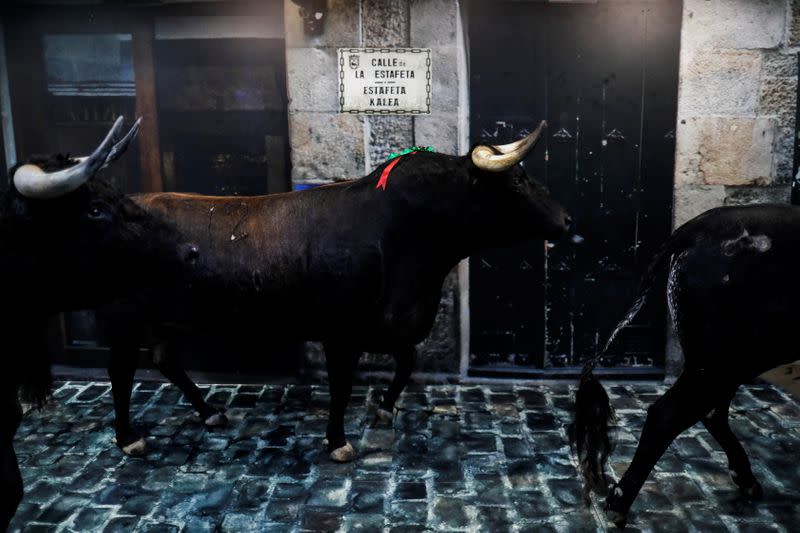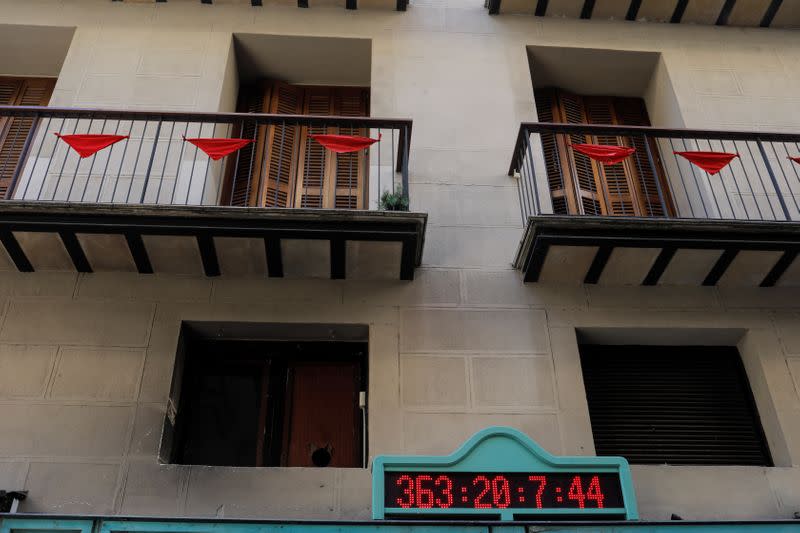A farewell to bulls? Regional, local leaders disagree on Spain's Pamplona festival
MADRID (Reuters) - Spain's San Fermin festival, which draws thrill-seekers from all over the world to run with fighting bulls through the streets of Pamplona, will be cancelled for the second year in a row because of the coronavirus pandemic, the regional head said on Tuesday.
Gripped by a third wave of infection, Spain reported 29,604 new cases on Tuesday, down from recent highs of more than 40,000 and pushing the overall tally to 2.85 million.
But the death toll jumped by 724 to 59,805 people in the biggest one-day rise since April.
"An international festival like San Fermin, in which millions of people come to Navarra, won't be possible," said Maria Chivite, the president of Navarra's regional government.
But the Diario de Navarra newspaper quoted Pamplona Mayor Enrique Maya as saying it was up to the city council and no decision had yet been made.
Such administrative tussles are common in a country where COVID restrictions vary from region to region, and sometimes city to city.
The San Fermin festival, which normally takes place every year in July, gained international fame from Ernest Hemingway's 1926 novel "The Sun Also Rises".
As well as the morning bull runs and afternoon bullfights, it features round-the-clock singing, dancing and drinking by revellers dressed in white clothes and red neckscarves. There are also religious events in honour of the saint.
Last year's cancellation was the first in over four decades and was a big financial blow to Pamplona's bars, restaurants and hotels. The last time it did not celebrate the festival two years in a row was during the civil war in the 1930s.
Meanwhile, the Madrid region's conservative leader, Isabel Diaz Ayuso, defended her decision to relax some restrictions, saying she had not seen any scientific evidence that meals in restaurants were more contagious than gatherings at home.
"Health is many things, not just avoiding infection," she said.
From Friday, groups of up to six will be allowed to gather in outdoor restaurant terraces, up from four now, while a 10 p.m. curfew might be pushed to midnight in the region, where people are still allowed to eat and drink inside bars and restaurants.
Ayuso has often clashed with the left-wing central government on how to tackle the virus.
"It's not advisable or reasonable to start hurrying to wind down (the restrictions)," government spokeswoman Maria Jesus Montero told a news conference.
The Spanish government decided on Tuesday to restrict air travel with Brazil and South Africa, where highly contagious variants of the coronavirus have been detected.
Inbound flights will only be able to carry returning Spanish nationals and residents or transit passengers heading out of the Schengen Area with stopovers shorter than 24 hours, it said.
(Reporting by Inti Landauro, Nathan Allen, Belen Carreno; Writing by Nathan Allen; Editing by Ingrid Melander and Angus MacSwan)

 Yahoo News
Yahoo News 

